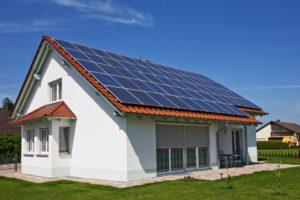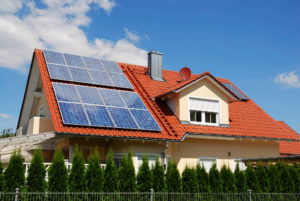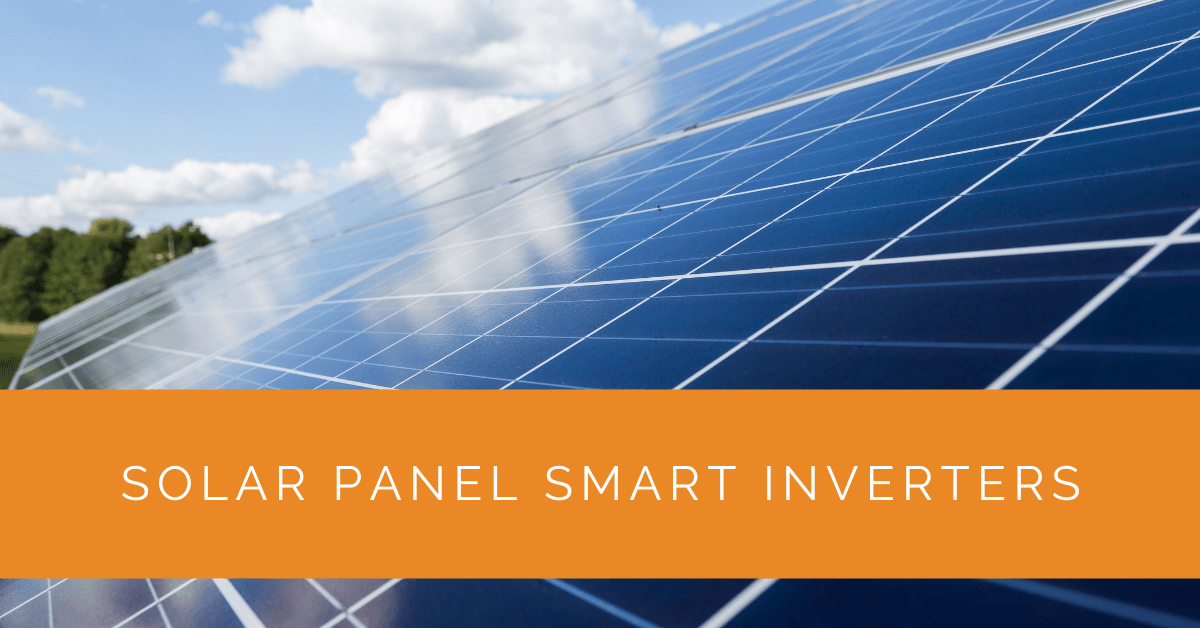Solar power systems are becoming increasingly popular as renewable energy solutions. Inverters are at the heart of these systems, which play a crucial role in converting the direct current (DC) generated by solar panels into usable alternating current (AC) electricity. In recent years, the emergence of smart inverters has revolutionized how solar energy integrates with the electrical grid. This article will explore solar panel smart inverters, their benefits, and their impact on grid integration.
Contents
- 1 Key Takeaways
- 2 The Basics of Solar Inverters
- 3 Smart Inverters and the Smart Grid
- 4 Rule 21 and Compliance with Smart Inverters
- 5 Hybrid Inverters: The Next Frontier
- 6 The Future of Smart Energy with Solar Inverters
- 7 Case Study: Integrating Smart Inverters to Optimize Solar Power Systems
- 8 Expert Insights From Our Solar Panel Installers About Exploring the Power of Solar Panel Smart Inverters
- 9 Experience Solar Excellence with Us!
- 10 Conclusion
- 11 FAQ
Key Takeaways
- Solar panel smart inverters revolutionize the integration of solar energy with the electrical grid, enabling bidirectional power flow and advanced grid interaction.
- Compliance with regulations such as Rule 21 ensures safe and reliable grid interconnection, facilitating greater renewable energy deployment.
- Hybrid inverters combine solar power, energy storage, and smart inverter capabilities, offering increased self-consumption, grid independence, and enhanced control over energy usage.
The Basics of Solar Inverters
Solar Inverters: Converting DC Power to AC Power
Solar inverters are essential components of solar power systems. They convert the DC electricity generated by solar panels into AC electricity, which is compatible with the electrical grid and can power homes, businesses, and other electrical loads. Traditional inverters perform this function efficiently but lack advanced features and capabilities.
Traditional Inverters vs. Smart Inverters
Smart or advanced inverters take solar inverter technology to the next level. Unlike traditional inverters, smart inverters have advanced features that enable bidirectional power flow and sophisticated grid interaction. These features allow for enhanced solar power system control, monitoring, and optimization.
Advantages of Smart Inverters for Solar Power Systems
Smart inverters offer several advantages over traditional inverters. They enable improved system performance, increased energy production, and enhanced safety. With advanced monitoring and control capabilities, smart inverters can actively manage voltage levels, respond to grid conditions, and ensure optimal solar system performance. Additionally, smart inverters facilitate grid integration, making it easier to comply with grid interconnection requirements and participate in utility programs.
Smart Inverters and the Smart Grid
Enabling Grid Flexibility and Stability
Smart inverters are vital in developing a smarter and more efficient electrical grid, commonly known as the smart grid. The smart grid aims to integrate renewable energy sources seamlessly and manage energy flows dynamically. Smart inverters enable greater grid flexibility by allowing solar systems to respond to grid conditions, such as voltage fluctuations and frequency deviations. They contribute to grid stability by actively regulating power output and maintaining consistent voltage levels.
Facilitating Bi-Directional Power Flow
One of the key features of smart inverters is their ability to facilitate bi-directional power flow. While traditional inverters only allow power to flow from solar panels to the grid, smart inverters enable power flow in both directions. This capability opens up possibilities for energy self-consumption, energy storage integration, and participation in utility programs such as net metering and demand response. By enabling bi-directional power flow, smart inverters empower solar system owners to optimize energy usage and maximize the benefits of their solar power systems.
Integrating with the Modern Smart Grid Infrastructure
Smart inverters are designed to integrate with the modern smart grid infrastructure seamlessly. They comply with industry standards like IEEE 1547 and grid interconnection requirements like Rule 21, which govern solar systems’ safe and reliable operation. By adhering to these standards and regulations, smart inverters ensure smooth interconnection with the utility grid and facilitate the stable integration of solar energy into the broader electrical system.

Rule 21 and Compliance with Smart Inverters
Overview of Rule 21 and Its Impact on Solar Power Systems
Rule 21 is a set of interconnection standards developed by the California Public Utilities Commission (CPUC) to ensure the safe and reliable integration of distributed energy resources, including solar power systems, into the electrical grid. It establishes technical requirements for grid interconnection, communication capabilities, and advanced functionalities of smart inverters.
Understanding the Requirements for Smart Inverter Compliance
Smart inverters must comply with specific requirements outlined in Rule 21. These requirements include voltage and frequency ride-through, power factor control, and remote communication capabilities. By complying with Rule 21, smart inverters contribute to grid stability, facilitate efficient grid operations, and enable greater renewable energy deployment.
Benefits of Complying with Rule 21
Compliance with Rule 21 is crucial for solar system owners, installers, and utilities. It ensures safe and reliable grid interconnection, promotes efficient grid management, and enables increased solar power deployment. Additionally, compliance with Rule 21 allows solar system owners to participate in utility programs and receive compensation for excess energy fed back into the grid.
Hybrid Inverters: The Next Frontier
Exploring the Advancements in Hybrid Inverter Technology
Hybrid inverters represent the next frontier in solar inverter technology. These advanced inverters combine the functionality of traditional solar inverters with energy storage capabilities. Hybrid inverters enable the seamless integration of solar power with energy storage systems, such as batteries, allowing for increased self-consumption and greater energy independence.
Combining Solar Power, Energy Storage, and Smart Inverter Capabilities
Hybrid inverters integrate solar power, energy storage, and smart inverter capabilities into a single device. This integration enables the efficient management and utilization of solar energy. Hybrid inverters can intelligently balance energy production and consumption, store excess energy for later use, and seamlessly switch between grid-connected and off-grid modes. They provide flexibility, resilience, and enhanced control over energy usage, making them a promising solution for maximizing the benefits of solar power systems.
Enhancing Self-Consumption and Grid Independence
By combining solar power and energy storage with smart inverter functionalities, hybrid inverters offer significant advantages. They enable higher levels of self-consumption, allowing solar system owners to utilize a greater portion of the energy they generate. Hybrid inverters also provide a path to grid independence by enabling off-grid operation during power outages or in remote locations. With the ability to intelligently manage solar power and energy storage, hybrid inverters empower individuals and communities to achieve greater energy self-sufficiency and resilience.

The Future of Smart Energy with Solar Inverters
Emerging Trends and Innovations in Smart Inverter Technology
The field of smart inverter technology is continuously evolving, with ongoing research and development focused on enhancing their capabilities and functionalities. Emerging trends include advanced communication protocols, improved grid integration algorithms, and enhanced monitoring and control features. These innovations aim to optimize further solar power systems’ performance, efficiency, and overall contribution to the smart grid.
Integration of Advanced Monitoring and Control Features
Smart inverters are increasingly equipped with advanced monitoring and control features. Real-time monitoring capabilities enable system owners to track the performance of their solar power systems, identify potential issues, and optimize energy production. Enhanced control features allow for more precise management of power output, voltage regulation, and grid interaction. Integrating these advanced features provides greater visibility and control over solar energy systems, improving efficiency and performance.
Paving the Way for a Smarter, More Efficient Energy Future
Smart inverters are instrumental in transitioning to a smarter, more efficient energy future. By enabling grid integration, facilitating bi-directional power flow, and complying with regulations, smart inverters contribute to the broader goals of renewable energy deployment and grid decarbonization. As smart inverter technology continues to advance, solar power systems will play an increasingly vital role in shaping the future of our energy landscape.
Case Study: Integrating Smart Inverters to Optimize Solar Power Systems
Background
At Solar Panels Network USA, we are committed to harnessing the latest technology to enhance the performance and integration of solar power systems. One of our commercial clients, operating a large-scale industrial facility, sought to improve their energy efficiency and reduce reliance on the grid. They faced challenges in managing energy consumption and optimizing solar power integration.
Project Overview
The project involved upgrading the existing solar power system with advanced smart inverters. The goal was to enhance energy management, ensure compliance with Rule 21, and increase the facility’s energy self-sufficiency. The implementation included the installation of smart inverters and the integration of a hybrid system with energy storage capabilities.
Implementation
Initial Assessment and Planning
We began with a comprehensive assessment of the client’s energy usage patterns, grid interactions, and existing solar system performance. Utilizing advanced data analytics and information extraction tools, we identified key areas for improvement.
Selection of Smart Inverters
Choosing the right smart inverters was critical. We selected inverters with favorable temperature coefficients, advanced monitoring capabilities, and compliance with Rule 21. This selection ensured optimal performance and seamless grid integration.
Installation and Integration
The installation process involved replacing traditional inverters with smart inverters and integrating a hybrid system that included energy storage. Our team of experienced technicians ensured proper setup, compliance with safety standards, and minimal disruption to the facility’s operations.
Real-Time Monitoring and Control
Post-installation, we deployed advanced monitoring systems to track the performance of the smart inverters and the overall solar power system. These systems provided real-time data on energy production, consumption, and grid interaction. We used this data for continuous optimization and performance analysis.
Results
- Enhanced Energy Management: The smart inverters enabled precise control over energy production and consumption. The facility achieved a 15% increase in energy efficiency by optimizing power flows and utilizing energy storage during peak demand.
- Grid Compliance and Stability: Compliance with Rule 21 ensured safe and reliable grid integration. The facility experienced fewer disruptions and improved overall grid stability, contributing to smoother operations.
- Increased Self-Sufficiency: The integration of a hybrid system allowed the facility to increase its energy self-sufficiency. The ability to store excess solar energy and use it during peak hours or outages reduced reliance on the grid and enhanced energy resilience.
- Cost Savings and Sustainability: The improvements led to significant cost savings on energy bills and a substantial reduction in the facility’s carbon footprint. The project demonstrated a strong commitment to sustainability and renewable energy adoption.
Summary
This case study highlights the transformative impact of integrating smart inverters into solar power systems. By leveraging advanced technology and compliance with regulations, Solar Panels Network USA successfully optimized energy management, increased self-sufficiency, and enhanced grid stability for a large-scale industrial facility. The project underscores the importance of smart inverters in driving the future of renewable energy and achieving sustainable energy goals.
Expert Insights From Our Solar Panel Installers About Exploring the Power of Solar Panel Smart Inverters
Smart inverters are a game changer for solar energy systems. They enable more efficient energy management and integration with the grid, providing greater reliability and control.
Chief Solar Technician
Compliance with Rule 21 is crucial for grid stability and safety. Smart inverters ensure our solar systems not only perform optimally but also adhere to stringent regulations, enhancing overall system reliability.
Solar Compliance Specialist
Hybrid inverters, combining solar power and energy storage, offer unmatched flexibility. They allow for better self-consumption, energy independence, and resilience, especially in areas prone to power outages.
Solar Installation Manager
Experience Solar Excellence with Us!
Trust in Solar Panels Network USA, where our seasoned experts deliver top-quality solar solutions for homes and businesses nationwide. With a legacy of countless successful installations and a commitment to sustainable energy, we’re your reliable partner in the solar journey. Ready for a brighter, eco-friendly future? Call us now at (855) 427-0058 and harness the power of the sun!
Conclusion
Smart inverters have transformed the capabilities of solar power systems, enabling enhanced grid integration, bidirectional power flow, and compliance with regulations. With their advanced functionalities, smart inverters unlock the full potential of solar energy, facilitating the transition to a cleaner and more sustainable energy future. By seamlessly integrating solar power into the electrical grid, smart inverters play a crucial role in reducing dependence on fossil fuels and mitigating the impacts of climate change. Facilitating bidirectional power flow empowers individuals and communities to maximize energy self-consumption, store excess energy for later use, and actively participate in utility programs. Moreover, compliance with regulations ensures the safe and reliable operation of solar power systems, promoting efficient grid management and accelerating the deployment of renewable energy. As smart inverter technology advances, we are poised to witness further advancements in grid flexibility, energy optimization, and realizing a smarter, more sustainable energy landscape. Embracing smart inverters and their advanced functionalities paves the way for a future powered by clean, reliable, and decentralized solar energy.
FAQ
What is a smart inverter for solar panels?
A smart inverter for solar panels is an advanced device that converts the direct current (DC) electricity generated into usable alternating (AC) electricity. It incorporates advanced features and functionalities that enable enhanced grid integration, bidirectional power flow, and sophisticated control and monitoring capabilities.
What do smart inverters do?
Smart inverters play a crucial role in optimizing the performance and integration of solar power systems. They facilitate bidirectional power flow, allowing solar energy to be utilized within the system and fed back into the electrical grid. Smart inverters actively monitor and regulate voltage levels, respond to grid conditions, and ensure optimal performance of solar systems.
What are the key features of smart solar inverters?
Key features of smart solar inverters include:
- Bidirectional Power Flow: Smart inverters enable power flow in both directions, allowing for energy self-consumption, energy storage integration, and participation in utility programs.
- Grid Interaction and Stability: Smart inverters contribute to grid flexibility and stability by actively managing voltage levels, responding to grid conditions, and maintaining consistent power output.
- Compliance with Regulations: Smart inverters comply with industry standards and grid interconnection requirements, such as Rule 21, ensuring safe and reliable grid integration.
- Advanced Monitoring and Control: Smart inverters offer advanced monitoring and control features, providing real-time performance data, enabling remote communication, and allowing for precise management of power output and grid interaction.
These features empower solar system owners, installers, and utilities to optimize energy production, participate in grid programs, and enhance solar power systems’ overall efficiency and performance.
About the Author
Solar Panels Network USA stands at the forefront of solar energy solutions, driven by a team of seasoned solar engineers and energy consultants. With over decades of experience in delivering high-quality solar installations and maintenance, we are committed to promoting sustainable energy through customer-centric, tailored solutions. Our articles reflect this commitment, crafted collaboratively by experts to provide accurate, up-to-date insights into solar technology, ensuring our readers are well-informed and empowered in their solar energy decisions.

